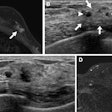Dear Women's Imaging Insider,
RSNA 2021 has come and gone, but our coverage of women's imaging research from the meeting continues. In Chicago, presenters from across the world shared the results of their investigations on topics ranging from the effects of COVID-19 on imaging practices to the benefits of digital breast tomosynthesis (DBT).
For example, one team from Rhode Island found that DBT may alleviate fatigue and caseloads for radiologists compared to mammography. Read how the COVID-19 pandemic played a role in this trend in this edition's Insider Exclusive.
Speaking of DBT, the modality has proved its validity over the past 10 years it has been available in the U.S., maintaining favorable recall, cancer detection, and false-negative rates, according to Dr. Liane Philpotts. Read more on how DBT has maintained its screening benefits over time.
Also, contrast-enhanced ultrasound lymphosonography can identify sentinel lymph nodes in breast cancer patients undergoing surgery. Find out how it performs compared to radioactive tracers and blue dye injections.
Plus, diffusion-weighted breast imaging has made strides in recent years as an alternative to dynamic contrast-enhanced MRI. But despite this method's potential for classifying breast lesions and evaluating response to therapy, researchers are calling for more multicenter studies and standardization.
Finally, check out the following women's imaging stories:
- Experts say they have eyewitness accounts that further make the case that two Canadian randomized trials conducted in the 1980s should not be used in breast screening meta-analyses or to inform policy.
- The COVID-19 pandemic heightened breast screening disparities, but researchers say facilities can help with this problem by increasing access to serve vulnerable patient populations.
- Artificial intelligence (AI) can benefit middle-income countries when it comes to breast screening as a second or third reader, which could help with radiologist workforce shortages.
- Combining DBT with AI can help even more with breast cancer outcomes. However, Dr. Emily Conant from the University of Pennsylvania says more rigorous trials are needed.
Find more articles like these by regularly visiting your Women's Imaging Community!




















